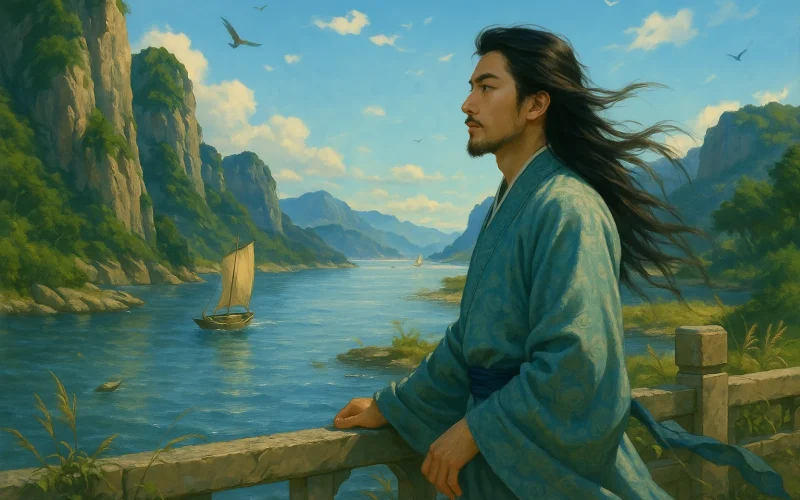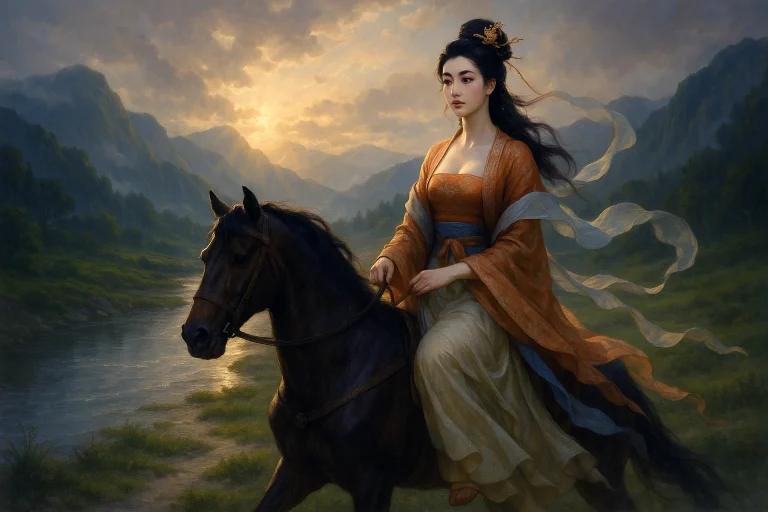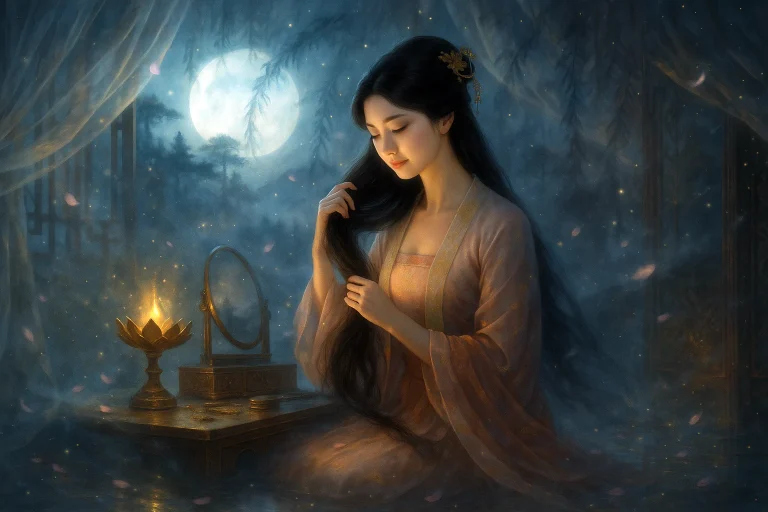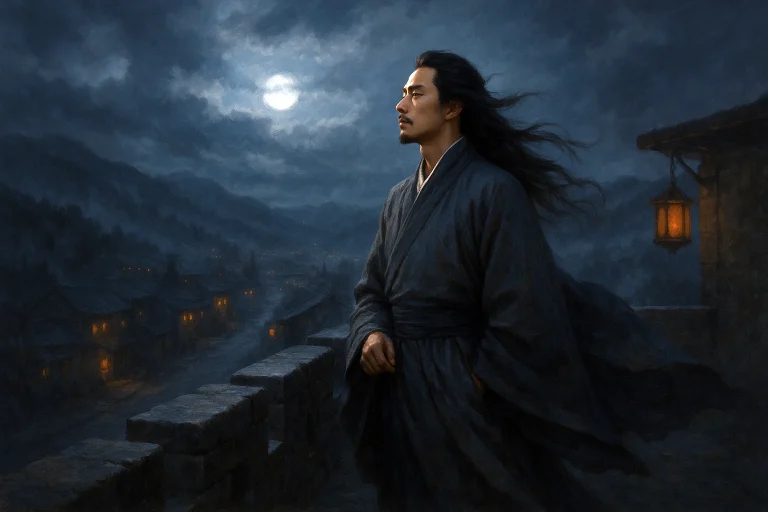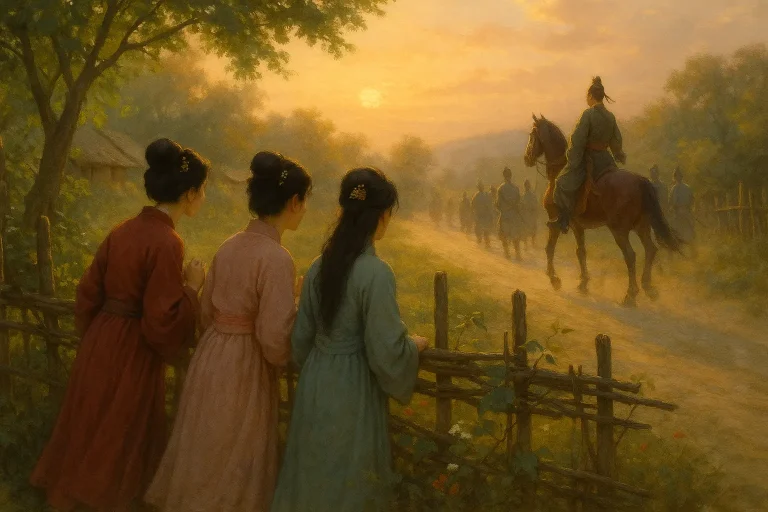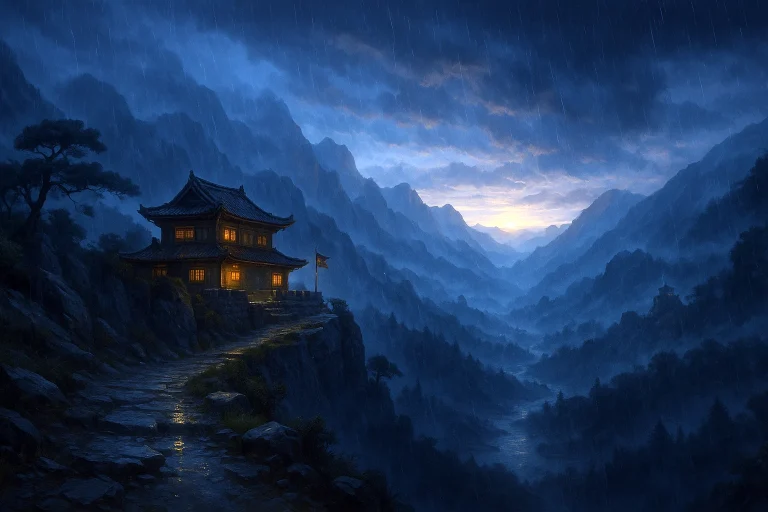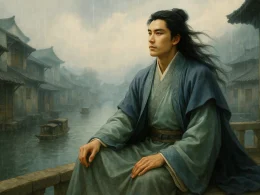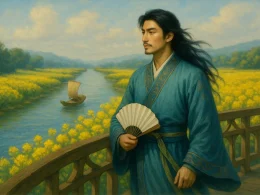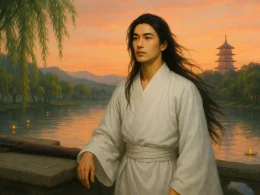Su Shi (苏轼, 1037 - 1101), a native of Meishan in Sichuan, was a polymath of the Northern Song literary world. His prose was expansive and unrestrained, his poetry fresh and vigorous, and his ci poetry pioneered the bold and unconstrained style. In calligraphy, he created the "Su Style," and in painting, he championed "spiritual resonance," earning him a place among the "Four Masters of the Song." Despite repeated political persecutions—most notably the "Poetry Case of the Black Terrace"—his exile to Huangzhou, Huizhou, and Danzhou yielded timeless masterpieces. Lu You praised him as "the literary patriarch of an era."
Major Works
Life
Su Shi was born in Meishan (modern-day Sichuan). Raised in a scholarly family, his grandfather Su Xu, though a commoner, was deeply cultured, while his father Su Xun began serious study at twenty-seven and later became one of the "Eight Great Prose Masters of the Tang and Song." His mother, Lady Cheng, came from an eminent family and personally educated Su Shi and his younger brother Su Zhe, often inspiring them with tales of the Eastern Han moral exemplar Fan Pang.
In 1056, at twenty, Su Shi traveled to the capital with his father and brother to take the imperial examinations. His essay On the Excesses of Reward and Punishment so impressed the chief examiner Ouyang Xiu that it was initially mistaken for the work of Ouyang’s protégé Zeng Gong and ranked second to avoid favoritism. This marked the beginning of Su Shi’s illustrious career. However, his mother’s death soon forced him to return to Sichuan for three years of mourning. In 1061, he passed the prestigious "Worthy and Virtuous" examination with the highest distinction (third rank, though effectively the top tier) and was appointed as a judicial officer in Fengxiang, formally entering officialdom.
During the Xining era (1068–1077), Wang Anshi’s New Policies divided the court. Su Shi, advocating gradual reform, clashed with the radical faction and requested postings away from the capital—serving in Hangzhou, Mizhou, and Xuzhou. As a local administrator, he relieved famine, controlled floods, and built irrigation works, demonstrating exceptional governance. The 1079 "Poetry Case of the Black Terrace" became a turning point: accused of "slandering the court" through his poetry, he narrowly escaped execution and was exiled to Huangzhou. There, reclaiming wasteland at Dongpo, he adopted his famous sobriquet and entered a new creative and philosophical phase.
Under the Yuanyou regency (1086–1093), the conservative faction regained power, and Su Shi was recalled to the capital as a Hanlin academician. Yet his refusal to wholly reject the New Policies led to renewed ostracism, and he was successively posted to Hangzhou and Yingzhou. In 1094, when Emperor Zhezong restored the reformists, the nearly sixty-year-old Su Shi was banished to Huizhou and then Danzhou (modern Hainan). In these remote lands, he established schools and fostered education, producing Hainan’s first provincial graduate. Pardoned in 1100, he died the following year in Changzhou, concluding a life of dramatic highs and lows.
Literary Achievements
Su Shi represents the pinnacle of Song literature, with groundbreaking contributions across poetry, ci, prose, and fu. His prose, continuing the Classical Prose Movement of Han Yu and Liu Zongyu, earned him and his father and brother the collective title "Three Sus" among the "Eight Great Masters." Political essays like Strategies for Training Militias showcase rigorous logic; historical commentaries like On Zhang Liang offer original insights; and informal writings like Night Stroll at Chengtian Temple brim with lyrical freshness. The First and Second Odes on the Red Cliff perfectly blend philosophical reflection with landscape description, becoming immortal masterpieces.
In poetry, Su Shi left over 2,700 works, rivaling Huang Tingjian as "Su-Huang." Early pieces like Remembering the Past at Mianchi with My Brother reveal his precocious talent; the Huangzhou-period Cold Food Festival Rains marks artistic maturity; and late works like Crossing the Sea on the 20th Night of the Sixth Month achieve transcendent mastery. He pioneered "prosifying poetry," integrating argumentation and erudition to expand poetic expression.
His ci poetry is especially monumental, pairing with Xin Qiji as "Su-Xin." Breaking from the convention of ci as "frivolous diversion," Hunting at Mizhou (to the tune of River Town) inaugurated the bold style; How Long Will the Moon Be Bright? (to the tune of Prelude to Water Melody) introduced philosophical depth; and Don’t Listen to the Rain (to Calming Wind and Waves) embodies transcendent equanimity. Hangzhou compositions like Drinking on West Lake After Rain seamlessly merge scenic beauty with personal sentiment.
In calligraphy and painting, he ranks among the "Four Song Masters." Advocating that "likeness in painting is child’s play," he laid theoretical groundwork for literati painting. Works like Withered Tree and Strange Rock and Bamboo and Rock by the Xiao-Xiang Rivers embody his aesthetic of "poetry and painting sharing one law."
Artistic Style
Su Shi’s style embodies a natural "form-follows-substance" quality. His prose flows "like clouds and water, without fixed form," rejecting obscurity. The First Ode on the Red Cliff interweaves philosophical musing—"Lamenting life’s brevity, I envy the Yangtze’s endless flow"—with imagery like "White dew across the river, waterlight meets sky," displaying effortless mastery.
His poetic language is fresh and spontaneous, finding profundity in the mundane. Spring River Evening Scene captures early spring with simplicity: "Beyond bamboos, two or three peach blooms; / River ducks know first when warm waters come." Inscribed on West Forest Temple’s Wall—"True face of Mount Lu can’t be seen— / You stand amidst its peaks"—embeds philosophy in landscape, concise yet profound.
His ci exhibit versatility, from the heroic "Great River eastward flows" (Memories of the Past at the Red Cliff, to Charms of Niannu) to the tender "Ten years, dead and living dim and drawn" (Dreaming of My Deceased Wife on the Night of the 20th, to River Town). Don’t Listen to the Rain fuses life insight with nature: "Listen not to rain beating on leaves— / Why not walk slow and chant free?" culminating in the enlightened "No wind, no rain, nor sunshine clear."
Theoretically, Su Shi asserted "poetry and painting share one law," urging artists to "find novelty within rules, lodge wonder in boldness." His works often reveal depth effortlessly, as in the Red Cliff Ode’s dialectic on "change and permanence," still illuminating today.
Cultural Legacy
Su Shi’s thought synthesized Confucianism, Buddhism, and Daoism. He upheld Confucian activism in governance yet embraced Buddhist-Daoist detachment when persecuted, forging a unique "Confucian exterior, Daoist interior" persona that balanced transcendence with compassion.
Culturally, he epitomized the Song literati’s highest ideals, merging intellectual pursuits with life artistry. Whether farming at Huangzhou or educating Hainan’s natives, he lived his credo: "Wherever my heart settles is home." His Dongpo’s Forest of Jottings pioneered the scholar’s notebook genre.
His influence spans centuries: in literature, his bold ci school shaped Xin Qiji and later poets; in art, his theories cemented the unity of poetry, calligraphy, and painting; in lifestyle, his philosophy of "the purest joy lies in life’s simple flavors" became a model. Yuan Haowen’s verdict: "After Dongpo, we forgot words—only his spirit remained."
Today, his ecological wisdom ("befriending fish and deer"), life aesthetics ("the world’s finest taste is quiet joy"), and resilience in adversity offer timeless wisdom. In 2000, France’s Le Monde named him one of twelve "Millennial Heroes"—the sole Chinese figure selected.






